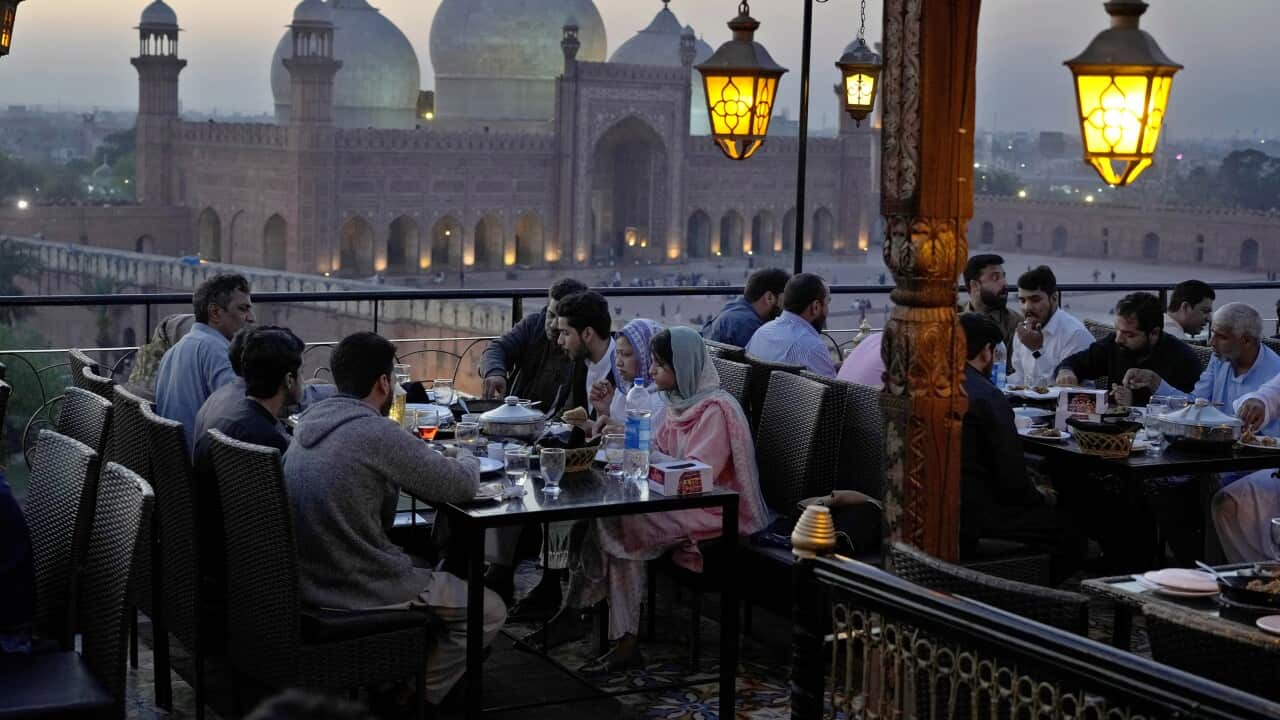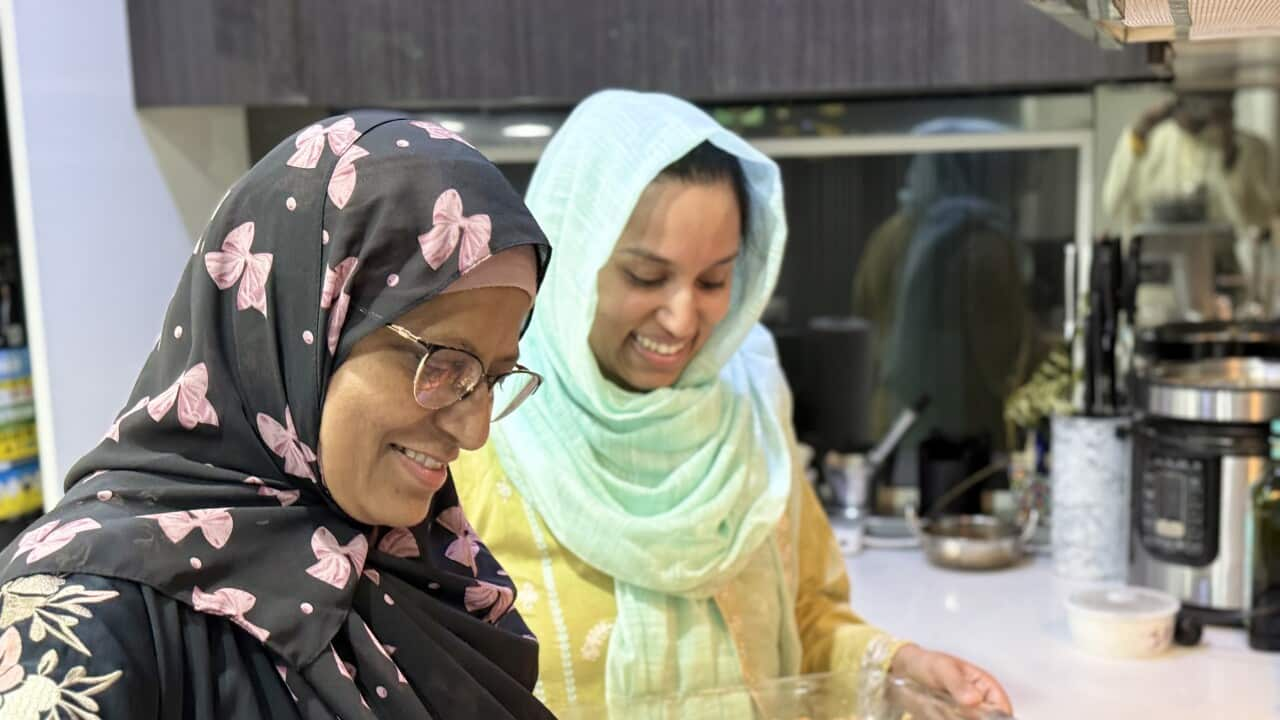Key Points
- Families say proper preparation is essential for observing Ramadan.
- Some try to involve children in meal preparation and share stories with them about the significance of Ramadan.
- The support of work colleagues is also important during this time.
Sithy Farzana, the mum of a five-year-old boy who works in the HR department of a Sydney office, describes Ramadan as a "deeply spiritual" period.
It's also an occasion that puts considerable demands on her time, as she looks to balance her work and home lives.
"Proper preparation and planning are essential for observing Ramadan while living and working in a migrant country like Australia," she told SBS Tamil.
Ramadan, the ninth month of the Islamic calendar, is one of the most sacred times for Muslims around the world.
During this month, Muslims observe a strict fast from dawn until sunset, refraining from eating or drinking (even water) during daylight hours.
The fast begins with suhoor — a pre-dawn meal — and is broken at sunset with prayer and a festive meal called iftar.
READ MORE

What to know about Ramadan
Family involvement in meal preparation
Ramadan, however, can present additional challenges as meals must be prepared before sunrise and after sunset, all while fasting for both suhoor and iftar.
While for families from some communities, women traditionally take on the majority of the cooking responsibilities, many try to address this.
"Creating a friendly Ramadan atmosphere at home and sharing small household chores — like cutting vegetables and setting the table — with my husband and son really reduces my workload," Rasheedha Basheer, a working woman from Brisbane, said.
Ramadan is also a time to strengthen family connections. Families can enhance the atmosphere by decorating their homes with hanging lights, banners or a Ramadan countdown calendar to make the month feel special.
Transforming iftar time into a spiritual gathering with family members deepens the connection and devotion, as Sudhabanu Kalvath, a housewife living in Perth, explained.
"Since there are so many special prayers during Ramadan, I prefer to prepare meals the day before, and freeze some ready-made dishes. This way, I can focus more on the prayers," she said.

Farrisa(Right) and Naseer(Left) in Sydney prepare a meal during Ramadan. Credit: Supplied
Involving children in meal preparation and sharing stories about the significance of Ramadan can teach them about the spiritual essence of the month.
A staple in many Tamil Muslim households during Ramadan is nombu kanji, a healthy porridge-like soup. This traditional dish is often offered to families by mosques in India to break the fast.
"Living in Sydney, we prepare it ourselves, but nowadays, with tools like the Instant Pot, we can make nombu kanji in under an hour," Farzana said.

Rasheedha's family enjoying iftar during Ramadan in Brisbane. Credit: Rasheedha
"I create a weekly meal prep chart before shopping for groceries, ensuring I stay organised and balanced throughout the week with Nazeer's help," Farrisa Divan Mohideen, a working woman from Sydney, added.
Balancing work and fasting
"Fasting during Ramadan can be challenging, especially when temperatures rise in summer. But this year, it’s not too hot here in Perth," Kalvath said.
During the daylight hours of fasting, energy levels naturally dip, so she said it’s advisable to avoid over-committing to work or social obligations during the month.
Basheer, from Brisbane, shared that her colleagues are understanding and supportive when it comes to fasting during Ramadan.
"My colleagues are very considerate, especially when eating in front of me at the office," Farzana said.
Managing energy wisely for essential activities and planning each day thoughtfully can help balance work commitments with fasting requirements.
Spiritual and community connection
Ramadan isn’t only about fasting; it’s a time for spiritual reflection, increased acts of worship and fostering a strong sense of community.
Culture also plays a significant role in how Ramadan is observed. While fasting may be central for some, others may see the month as an opportunity for socialising, visiting family and friends, and engaging in prayer, including completing the recitation of the entire Quran.

Family and friends praying during Ramadan in Brisbane. Credit: Rasheedha
Following iftar, it is customary for Muslims to visit family and friends, which fosters a sense of togetherness. This tradition strengthens bonds within the multicultural community in Australia.
“It’s also important for us to educate non-Muslim friends and families about Ramadan and our culture,” says Farzana.

Sudhabanu's family enjoying meal during iftar in Perth. Credit: Banu
To hear more podcasts from SBS Tamil, subscribe to our collection. Listen to SBS Tamil at 12 noon on channel on Mondays, Wednesdays, Thursdays and Fridays & 8pm on Mondays, Wednesdays, Fridays and Sundays on SBS Radio 2. Find your area’s radio frequency by visiting our page. For listening on , search for ‘’. On SBS South Asian YouTube channel, follow SBS Tamil podcasts and videos. You can also enjoy programs in 10 South Asian languages, plus SBS Spice content in English. It is also available on SBS On Demand.

